-
 bitcoin
bitcoin $103128.103252 USD
-3.33% -
 ethereum
ethereum $3437.127692 USD
-4.86% -
 tether
tether $0.999700 USD
-0.02% -
 xrp
xrp $2.403993 USD
-5.73% -
 bnb
bnb $961.374676 USD
-4.11% -
 solana
solana $154.938665 USD
-8.18% -
 usd-coin
usd-coin $1.000113 USD
0.03% -
 tron
tron $0.298122 USD
0.30% -
 dogecoin
dogecoin $0.172428 USD
-5.76% -
 cardano
cardano $0.557625 USD
-7.13% -
 hyperliquid
hyperliquid $38.740701 USD
-6.51% -
 chainlink
chainlink $15.306051 USD
-7.51% -
 bitcoin-cash
bitcoin-cash $507.558648 USD
-3.26% -
 stellar
stellar $0.281899 USD
-6.74% -
 unus-sed-leo
unus-sed-leo $9.241811 USD
0.57%
Is it safe to sign a transaction with a new smart contract?
Always verify smart contract audits, ownership, and code before signing—unlimited approvals or unverified contracts can lead to irreversible fund loss.
Nov 06, 2025 at 09:39 am
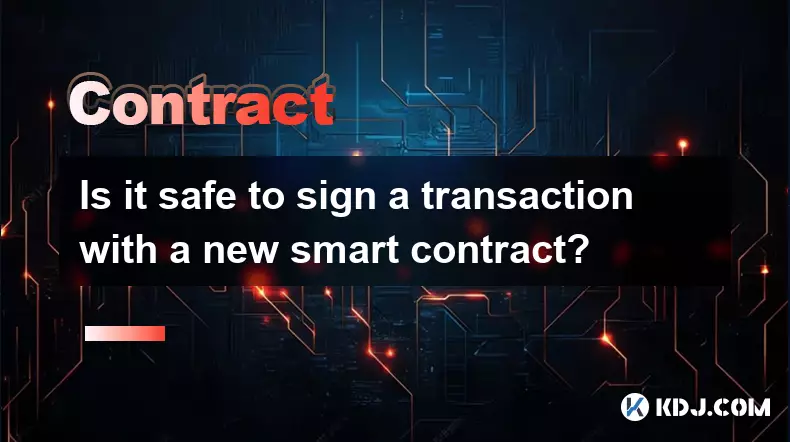
Understanding the Risks of Signing Transactions with New Smart Contracts
1. Every time a user signs a transaction involving a new smart contract, they expose themselves to potential risks that may not be immediately visible. These contracts are immutable once deployed, meaning any flaws or malicious functions cannot be altered after the fact.
2. Unknown code behavior is one of the most significant concerns. Without a comprehensive audit or public verification, the contract could include functions designed to drain wallet balances, lock funds indefinitely, or redirect assets to unauthorized addresses.
3. Phishing attacks often disguise malicious contracts as legitimate ones. A fake decentralized exchange or NFT marketplace might prompt users to sign what appears to be a routine approval, only to grant full access to their holdings.
4. Even if the contract’s source code is available, most users lack the technical expertise to analyze Solidity or Rust logic thoroughly. Relying solely on interface claims without verifying backend functionality increases vulnerability.
5. Front-running and sandwich attacks can also be embedded in contract logic, especially within decentralized finance (DeFi) platforms. Users might unknowingly authorize transactions that manipulate token prices to the benefit of attackers.
Always Verify Contract Ownership and Audit Status Before Interacting
1. Reputable projects typically publish third-party audit reports from firms like CertiK, PeckShield, or OpenZeppelin. The absence of such documentation should raise immediate suspicion.
2. Check if the contract has been verified on block explorers like Etherscan or BscScan. Verified contracts allow users to review the actual code, compare it with GitHub repositories, and confirm there are no hidden functions.
3. Look for community trust indicators such as long-standing deployment history, consistent interaction volume, and recognition by established platforms like Uniswap or Aave.
4. Use tools like Tenderly or Forta to simulate transactions before signing. These services can detect unusual behaviors, such as unexpected token approvals or excessive gas consumption.
5. Confirm whether the contract owner has renounced control. Contracts where ownership remains active could be updated or exploited by the developer at any time, even if currently safe.
Best Practices for Secure Wallet Interaction
1. Limit permissions using wallet features like “Revoke Approval” tools. Instead of granting infinite token allowances, specify exact amounts needed for each transaction.
2. Utilize dedicated wallets for interacting with untrusted contracts. Keeping primary funds in a separate, secure wallet minimizes exposure if an interaction turns out to be malicious.
3. Enable transaction decoding in wallets like MetaMask or Rabby. This feature translates raw data into human-readable actions, revealing exactly what permissions are being granted.
4. Monitor real-time alerts through blockchain monitoring dashboards. Services like De.Fi Shield or BlockSec provide instant notifications when suspicious contract patterns are detected.
5. Avoid rushing into early-stage project interactions based on social media hype. Newly launched contracts with minimal scrutiny are prime targets for exploitation.
Frequently Asked Questions
What does it mean when a smart contract requests unlimited token approval?Unlimited token approval allows the contract to spend all of your tokens of that type without further consent. This poses a high risk if the contract is compromised or malicious.
Can a signed transaction be reversed if it interacts with a harmful contract?No. Blockchain transactions are irreversible once confirmed. If a signed transaction grants access to funds, those assets may be lost permanently unless recovered through external intervention.
How can I check if a smart contract has been audited?Visit the project’s official website and look for audit reports from known security firms. Cross-reference these findings on the contract’s page on Etherscan or similar explorers.
Is open-source code enough to guarantee a smart contract is safe?Not necessarily. While open-source code allows transparency, it must also be independently audited and widely reviewed. Malicious logic can be hidden within complex or obfuscated code structures.
Disclaimer:info@kdj.com
The information provided is not trading advice. kdj.com does not assume any responsibility for any investments made based on the information provided in this article. Cryptocurrencies are highly volatile and it is highly recommended that you invest with caution after thorough research!
If you believe that the content used on this website infringes your copyright, please contact us immediately (info@kdj.com) and we will delete it promptly.
- DESK Token, Tokenized Real Estate, and Venture Hub: A New Era in Digital Assets
- 2025-11-12 16:55:02
- JPM Coin, Blockchain, and Public Tokens: The Future of Institutional Finance?
- 2025-11-12 17:10:00
- Ethereum's Whale Watch: Upgrade Incoming!
- 2025-11-12 17:10:00
- DOGE: Analyzing the Price and Potential – Will Dogecoin Reach $1?
- 2025-11-12 17:10:02
- JPMD, USD Token, and Base Network: JPMorgan's Blockchain Leap
- 2025-11-12 17:10:02
- Treasury Plays Evolve: Beyond MSTR with Blockchain Engineering
- 2025-11-12 17:20:01
Related knowledge
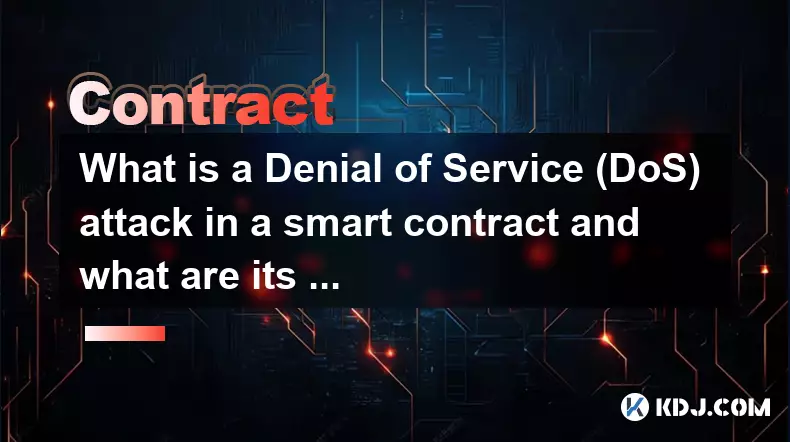
What is a Denial of Service (DoS) attack in a smart contract and what are its common forms?
Nov 10,2025 at 05:20am
Understanding Denial of Service in Smart Contracts1. A Denial of Service (DoS) attack in the context of smart contracts refers to a scenario where a m...

What is a cryptographic nonce used for in transaction signing?
Nov 11,2025 at 05:59am
Understanding Cryptographic Nonces in Blockchain Transactions1. A cryptographic nonce is a random or pseudo-random number used only once in the contex...
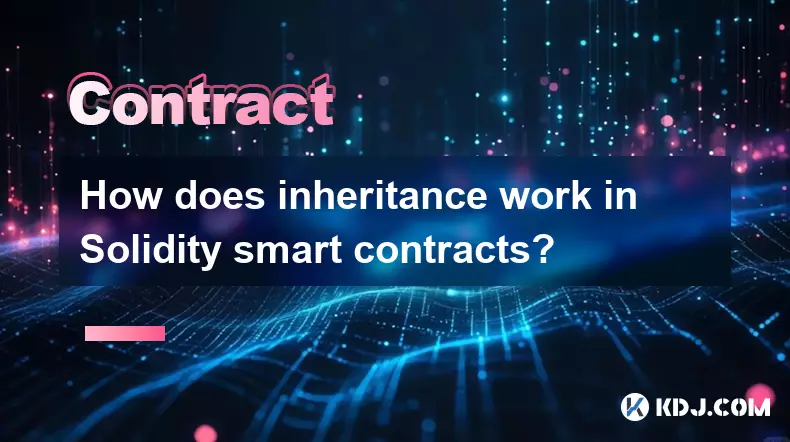
How does inheritance work in Solidity smart contracts?
Nov 11,2025 at 10:40pm
Inheritance in Solidity: Building Modular Smart Contracts1. Inheritance in Solidity allows one contract to adopt the properties and functions of anoth...

What is a Minimal Proxy Contract (EIP-1167) and how does it save gas on deployment?
Nov 12,2025 at 11:39am
What is a Minimal Proxy Contract (EIP-1167)?1. A Minimal Proxy Contract, standardized under Ethereum Improvement Proposal (EIP) 1167, is a lightweight...
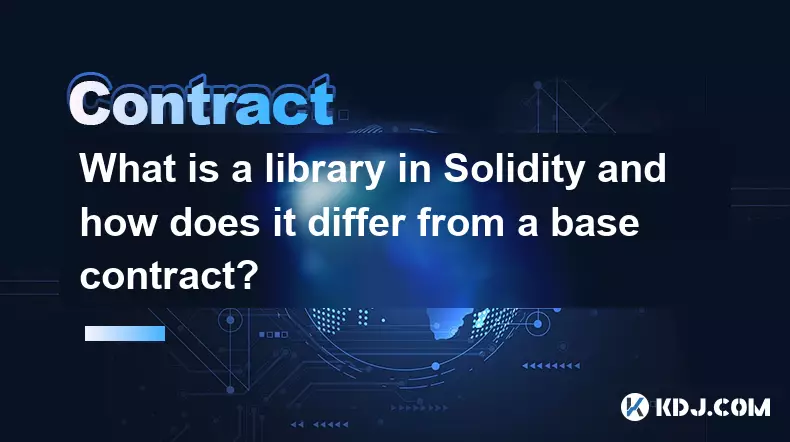
What is a library in Solidity and how does it differ from a base contract?
Nov 12,2025 at 09:19am
Understanding Libraries in Solidity1. A library in Solidity is a special type of contract designed to hold reusable functions that can be shared acros...
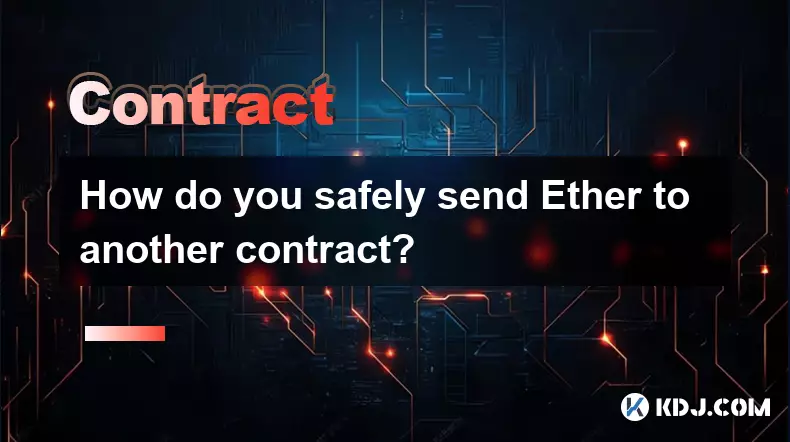
How do you safely send Ether to another contract?
Nov 09,2025 at 06:40pm
Sending Ether to Smart Contracts: Key Considerations1. Verify that the receiving contract has a payable fallback function or a designated payable func...

What is a Denial of Service (DoS) attack in a smart contract and what are its common forms?
Nov 10,2025 at 05:20am
Understanding Denial of Service in Smart Contracts1. A Denial of Service (DoS) attack in the context of smart contracts refers to a scenario where a m...

What is a cryptographic nonce used for in transaction signing?
Nov 11,2025 at 05:59am
Understanding Cryptographic Nonces in Blockchain Transactions1. A cryptographic nonce is a random or pseudo-random number used only once in the contex...

How does inheritance work in Solidity smart contracts?
Nov 11,2025 at 10:40pm
Inheritance in Solidity: Building Modular Smart Contracts1. Inheritance in Solidity allows one contract to adopt the properties and functions of anoth...

What is a Minimal Proxy Contract (EIP-1167) and how does it save gas on deployment?
Nov 12,2025 at 11:39am
What is a Minimal Proxy Contract (EIP-1167)?1. A Minimal Proxy Contract, standardized under Ethereum Improvement Proposal (EIP) 1167, is a lightweight...

What is a library in Solidity and how does it differ from a base contract?
Nov 12,2025 at 09:19am
Understanding Libraries in Solidity1. A library in Solidity is a special type of contract designed to hold reusable functions that can be shared acros...

How do you safely send Ether to another contract?
Nov 09,2025 at 06:40pm
Sending Ether to Smart Contracts: Key Considerations1. Verify that the receiving contract has a payable fallback function or a designated payable func...
See all articles


























![[4K 60fps] no care by crashpancake2 (1 Coin) [4K 60fps] no care by crashpancake2 (1 Coin)](/uploads/2025/11/12/cryptocurrencies-news/videos/6913a8862890b_image_500_375.webp)














































